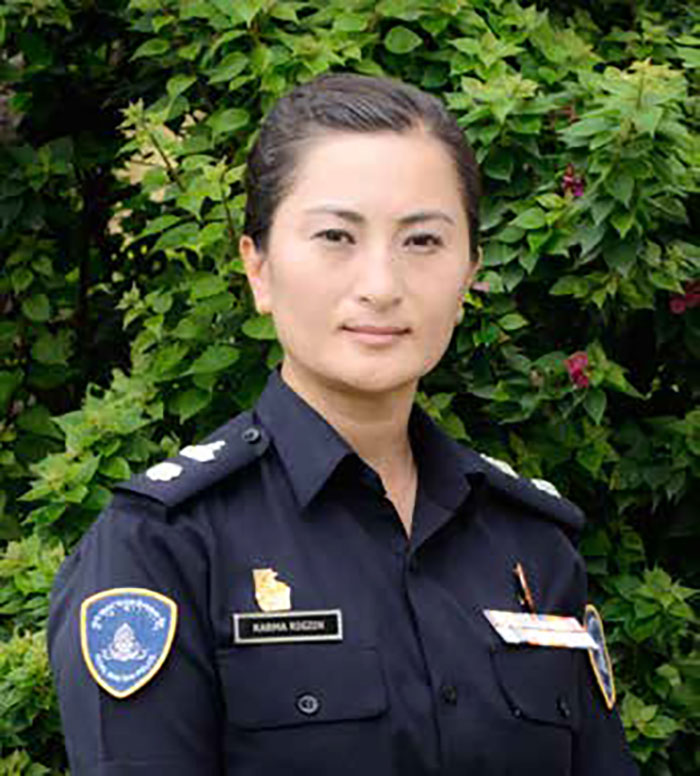Choki Wangmo

Lieutenant Colonel Karma Rigzin
In 2000, when Karma Rigzin decided to join the police force after graduation, her parents were upset. Her grandmother wept. It is a tough job meant for men, they tried to convince her. She could not be knuckled under.
She became a police officer.
Karma Rigzin is today among the three senior women lieutenant colonels in the country. Recently, the US State Department recognised Karma Rigzin for her relentless effort in combating trafficking in Bhutan. Her parents and the 10-year-old daughter could not be more proud.
After graduating with Political Science from Delhi University, she thought of becoming a lawyer. But that was just a whim. When the opportunity to join the police force came, she had to lay hold of it.
About the recognition, Karma Rigzin said: “I didn’t expect this recognition, as it was my line of duty. I think the passion and hard work that I put in this cause mattered. I am humbled and encouraged. ”
Since starting the women and child protection unit in Royal Bhutan Police under her supervision in 2006, Karma Rigzin said that there have been many encouraging developments in combating human trafficking in the country. “When I prosecuted my first human trafficking case, not many were aware of trafficking in person (TIP).”
Cases involved mostly women and children who were uneducated and vulnerable. Once, she prosecuted the case that involved a 16-year-old girl from Darjeeling who was trafficked and locked inside a house by a Bhutanese man.
The lack of awareness was a serious challenge, Karma Rigzin said.
In the beginning, Karma Rigzin found communicating with the management difficult, but the times were changing. “When you are a woman officer, it is hard to get your messages across but you have to prove yourself. Workload is heavy.”
After completing her service with UN peacekeeping in Sudan in 2017, Karma Rigzin was actively involved in TIP. She looked into old cases related to TIP and started documenting them. She also mentored young officers and desuups and drafted an SOP on TIP. She has developed innovative practices for compiling human trafficking-related data and was responsible for establishing a human trafficking awareness programme for Bhutanese travelling overseas for employment.
The unit, which has 14 trafficking cases in hand, has sensitised 1,288 Bhutanese so far.
TIP report on Bhutan
The 20th edition of the report, published last month, stated that due to Bhutanese law’s inconsistencies with international law, courts continued to dismiss trafficking charges in cases that met the international definition of trafficking. Officials did not identify any trafficking victims during the reporting period. The government did not provide protective services to Bhutanese labour trafficking victims identified abroad, and the government continued to rely on civil society leadership for some anti-trafficking efforts.
However, Bhutan is upgraded to Tier 2 Watch List, meaning the government does not fully meet the minimum standards for the elimination of trafficking but is making significant efforts to do so.
These achievements included convicting one individual under the human trafficking statute, appealing the dismissal of trafficking charges in a second trafficking case, finalising and disseminating standard operating procedures (SOPs) for victim identification and referral, and initiating an investigation into reports of labour exploitation, including forced labour, among Bhutanese workers abroad.
The report recommended amending the Penal Code’s Sections 154 and 227, and Section 224 of the Child Care and Protection Act to bring the definition of human trafficking in line with the 2000 UN TIP Protocol, vigorously investigate, prosecute, and convict traffickers with significant terms of imprisonment and increase proactive trafficking victim identification, including by training officials on, and implementing, the SOPs.
Each year, the Department of State honours individuals around the world who have devoted their lives to the fight against human trafficking. These individuals include NGO workers, lawmakers, government officials, survivors of human trafficking, and concerned citizens.

